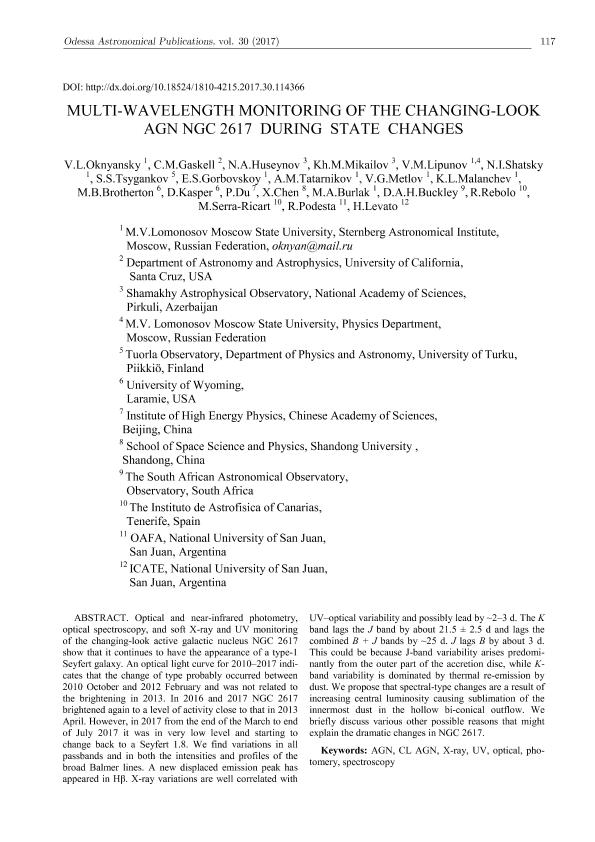Mostrar el registro sencillo del ítem
dc.contributor.author
Oknyansky, V. L.
dc.contributor.author
Gaskell, C. M.
dc.contributor.author
Mikailov, K. M.
dc.contributor.author
Lipunov, V. M.
dc.contributor.author
Shatsky, N. I.
dc.contributor.author
Tsygankov, S. S.
dc.contributor.author
Gorbovskoy, E. S.
dc.contributor.author
Tatarnikov, A. M.
dc.contributor.author
Metlov, V. G.
dc.contributor.author
Malanchev, K. L.
dc.contributor.author
Brotherton, M. B.
dc.contributor.author
Kasper, D.
dc.contributor.author
Du, P.
dc.contributor.author
Chen, X.
dc.contributor.author
Burlak, M. A.
dc.contributor.author
Buckley, D. A. H.
dc.contributor.author
Rebolo, R.
dc.contributor.author
Serra-Ricart, M.
dc.contributor.author
Podestá, Ricardo César

dc.contributor.author
Levato, Orlando Hugo

dc.date.available
2020-03-16T15:39:38Z
dc.date.issued
2017-11
dc.identifier.citation
Oknyansky, V. L.; Gaskell, C. M.; Mikailov, K. M.; Lipunov, V. M.; Shatsky, N. I.; et al.; Multi-Wavelength Monitoring of the Changing-Look AGN NGC 2617 during State Changes; Odessa National University; Odessa Astronomical Publications; 30; 11-2017; 117-120
dc.identifier.issn
1810-4215
dc.identifier.uri
http://hdl.handle.net/11336/99644
dc.description.abstract
Optical and near-infrared photometry, optical spectroscopy, and soft X-ray and UV monitoring of the changing-look active galactic nucleus NGC 2617 show that it continues to have the appearance of a type-1 Seyfert galaxy. An optical light curve for 2010-2017 indicates that the change of type probably occurred between 2010 October and 2012 February and was not related to the brightening in 2013. In 2016 and 2017 NGC 2617 brightened again to a level of activity close to that in 2013 April. However, in 2017 from the end of the March to end of July 2017 it was in very low level and starting to change back to a Seyfert 1.8. We find variations in all passbands and in both the intensities and profiles of the broad Balmer lines. A new displaced emission peak has appeared in Hβ. X-ray variations are well correlated with UV-optical variability and possibly lead by ̃2-3 d. The K band lags the J band by about 21.5 ± 2.5 d and lags the combined B + J bands by ̃25 d. J lags B by about 3 d. This could be because J-band variability arises predominantly from the outer part of the accretion disc, while K-band variability is dominated by thermal re-emission by dust. We propose that spectral-type changes are a result of increasing central luminosity causing sublimation of the innermost dust in the hollow bi-conical outflow. We briefly discuss various other possible reasons that might explain the dramatic changes in NGC 2617.
dc.format
application/pdf
dc.language.iso
eng
dc.publisher
Odessa National University
dc.rights
info:eu-repo/semantics/openAccess
dc.rights.uri
https://creativecommons.org/licenses/by-nc-sa/2.5/ar/
dc.subject
Agn
dc.subject
X-Ray
dc.subject
Uv
dc.subject
Photometry
dc.subject.classification
Astronomía

dc.subject.classification
Ciencias Físicas

dc.subject.classification
CIENCIAS NATURALES Y EXACTAS

dc.title
Multi-Wavelength Monitoring of the Changing-Look AGN NGC 2617 during State Changes
dc.type
info:eu-repo/semantics/article
dc.type
info:ar-repo/semantics/artículo
dc.type
info:eu-repo/semantics/publishedVersion
dc.date.updated
2018-10-22T17:28:10Z
dc.journal.volume
30
dc.journal.pagination
117-120
dc.journal.pais
Ucrania

dc.description.fil
Fil: Oknyansky, V. L.. Sternberg Astronomical Institute; Rusia
dc.description.fil
Fil: Gaskell, C. M.. Department of Astronomy and Astrophysics. University of California. Santa Cruz; Estados Unidos
dc.description.fil
Fil: Mikailov, K. M.. Shamakhy Astrophysical Observatory, National Academy of Sciences.
Pirkuli; Azerbaiyán
dc.description.fil
Fil: Lipunov, V. M.. Sternberg Astronomical Institute. M.V.Lomonosov Moscow State University ; Rusia
dc.description.fil
Fil: Shatsky, N. I.. Sternberg Astronomical Institute. M.V.Lomonosov Moscow State University; Rusia
dc.description.fil
Fil: Tsygankov, S. S.. Tuorla Observatory, Department of Physics and Astronomy. University of Turku.; Finlandia
dc.description.fil
Fil: Gorbovskoy, E. S.. Sternberg Astronomical Institute. M.V.Lomonosov Moscow State University; Rusia
dc.description.fil
Fil: Tatarnikov, A. M.. Sternberg Astronomical Institute. M.V.Lomonosov Moscow State University; Rusia
dc.description.fil
Fil: Metlov, V. G.. Sternberg Astronomical Institute. M.V.Lomonosov Moscow State University; Rusia
dc.description.fil
Fil: Malanchev, K. L.. Sternberg Astronomical Institute. M.V.Lomonosov Moscow State University; Rusia
dc.description.fil
Fil: Brotherton, M.B.. University of Wyoming; Estados Unidos
dc.description.fil
Fil: Kasper, D.. University of Wyoming; Estados Unidos
dc.description.fil
Fil: Du, P.. Institute of High Energy Physics. Chinese Academy of Sciences; China
dc.description.fil
Fil: Chen, X.. School of Space Science and Physics. Shandong University; China
dc.description.fil
Fil: Burlak, M. A.. Sternberg Astronomical Institute. M.V.Lomonosov Moscow State University; Rusia
dc.description.fil
Fil: Buckley, D. A. H.. The South African Astronomical Observatory; Sudáfrica
dc.description.fil
Fil: Rebolo, R.. Instituto de Astrofisica de Canarias; España
dc.description.fil
Fil: Serra-Ricart, M.. Instituto de Astrofisica de Canarias; España
dc.description.fil
Fil: Podestá, R.. Universidad Nacional de San Juan; Argentina
dc.description.fil
Fil: Levato, O. H.. Consejo Nacional de Investigaciones Científicas y Técnicas. Centro Científico Tecnológico Conicet - San Juan. Instituto de Ciencias Astronómicas, de la Tierra y del Espacio. Universidad Nacional de San Juan. Instituto de Ciencias Astronómicas, de la Tierra y del Espacio; Argentina
dc.journal.title
Odessa Astronomical Publications
dc.relation.alternativeid
info:eu-repo/semantics/altIdentifier/doi/https://dx.doi.org/10.18524/1810-4215.2017.30.114366
dc.relation.alternativeid
info:eu-repo/semantics/altIdentifier/url/http://oap.onu.edu.ua/article/view/114366
Archivos asociados
